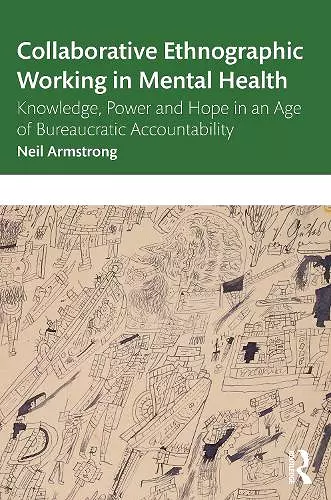Collaborative Ethnographic Working in Mental Health
Knowledge, Power and Hope in an Age of Bureaucratic Accountability
Format:Paperback
Publisher:Taylor & Francis Ltd
Published:7th Dec '23
Currently unavailable, and unfortunately no date known when it will be back

Collaborative Ethnographic Working in Mental Health seeks to chart a new direction for research into mental healthcare, with the aim of creating the conditions for more productive interdisciplinary dialogue.
People involved in mental health often fail to recognise how they are described by researchers from the humanities and social sciences, which inhibits productive collaboration. This book seeks to address this problem, by including clinicians and patients in the research process and by shifting attention away from power and knowledge and towards the organisational context. It explores how clinical thinking and behaviour, illness experience, and clinical relationships are all shaped by the bureaucratic context. In particular, it examines tensions between what we want from mental healthcare and how accountable bureaucracies actually work, and proposes that mental healthcare research should not just evaluate new interventions but should investigate new ways of organising.
This book is written with a non-specialist audience in mind, as it is intended for all with a stake in mental healthcare research and practice. It is also for those with an interest in ethnographic methods, as a novel way of deploying ethnography, autoethnography and coproduced ethnography to address clinically important research topics.
"Each chapter has a clear message and offers conceptual insight unmasked by anthropologists’ usual convoluted prose. The focus on bureaucracy in practice, and its internal effects, has wide implications for clinical research, opening the lid on that which is neglected in usual intervention-focused studies. In this sense, the book is a major cross-disciplinary bridge-building contribution. Indeed, I think the book makes clear in a way that few others have, why ethnographic research is important to getting to the heart of contemporary dilemmas in psychiatric care; especially by taking seriously the everyday experience and representational practices of patients and staff. The book avoids polarising debate around psychiatry, and taking a fresh viewpoint provides a common platform of shared concern about real challenges." -- David Mosse, Professor of Social Anthropology, SOAS, University of London, UK
"Dr Armstrong’s incisive analysis of the mental health system challenges complacent and particularised explanations and presents a mature and systemic account of why mental health systems continue to struggle – harm – fail. Sharing his own lived experience of recovery and evolving agency, we see the demise of well-intentioned and highly trained clinicians to serve the structural and bureaucratic agency of the institution, be that the state, the hospital, the prison and criminal justice system. He does this through the powerful stories and voice of the most afflicted, marginalised, and excluded, providing some seminal lessons for practitioners, policy makers, legislators. Although he brings theory into to the analysis, he does so cautiously, never failing to sketch out the limitations of worshipping theory rather than testing it through real world experience and local realities." -- Professor Kamaldeep Bhui, Professor of Psychiatry and Senior Research Fellow, University of Oxford, UK
"Each chapter has a clear message and offers conceptual insight unmasked by anthropologists’ usual convoluted prose. The focus on bureaucracy in practice, and its internal effects, has wide implications for clinical research, opening the lid on that which is neglected in usual intervention-focused studies. In this sense, the book is a major cross-disciplinary bridge-building contribution. Indeed, I think the book makes clear in a way that few others have, why ethnographic research is important to getting to the heart of contemporary dilemmas in psychiatric care; especially by taking seriously the everyday experience and representational practices of patients and staff. The book avoids polarising debate around psychiatry, and taking a fresh viewpoint provides a common platform of shared concern about real challenges." -- David Mosse, Professor of Social Anthropology, SOAS, University of London, UK
"Dr Armstrong’s incisive analysis of the mental health system challenges complacent and particularised explanations and presents a mature and systemic account of why mental health systems continue to struggle – harm – fail. Sharing his own lived experience of recovery and evolving agency, we see the demise of well-intentioned and highly trained clinicians to serve the structural and bureaucratic agency of the institution, be that the state, the hospital, the prison and criminal justice system. He does this through the powerful stories and voice of the most afflicted, marginalised, and excluded, providing some seminal lessons for practitioners, policy makers, legislators. Although he brings theory into to the analysis, he does so cautiously, never failing to sketch out the limitations of worshipping theory rather than testing it through real world experience and local realities." -- Professor Kamaldeep Bhui, Professor of Psychiatry and Senior Research Fellow, University of Oxford, UK
ISBN: 9780367722944
Dimensions: unknown
Weight: 263g
180 pages